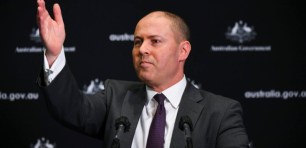
Steven Marshall (left) and Peter Malinauskas (right) during a leaders debate at the South Australia Press Club in Adelaide on March 10, 2022. Source: AAP Matt Turner.
Four factors provide the explanation for the Liberal loss in South Australia.
The first and most important one is Steven Marshall himself, and the nature of his victory four years ago. Labor had been in power for 16 years, and voters were desperate for a change — they would have voted for anyone, and Marshall happened to be the man lucky enough to be riding this wave.
SA voters never had a positive impression of Marshall; they regarded him as adequate for the job — and that’s about all. During the 2018 campaign, premier Jay Weatherill was consistently more popular than Marshall on a personal level. Marshall should’ve had a colossal win in 2018; instead he snuck in by only one seat.
Division and disunity are death in Australian politics, and the infighting and turmoil in Marshall’s government played significant roles in weakening voter support.
So on Saturday, SA voters had little real investment in the premier, a lacklustre placeholder who struggled in the campaign against the more telegenic and campaign-ready in Labor’s Peter Malinauskas.
Health is an issue in virtually every campaign in Australia — because voters are usually locked in to their positions, it doesn’t shift much in the way of votes — but this election was different. The hospital ramping crisis became a white-hot issue the ALP campaign exploited mercilessly. Pictures of ambulances queued up outside Adelaide hospitals left an indelible impression.
What is remarkable, and a tribute both to the sophistication of the ALP campaign and the new Premier’s political skills, is that Malinauskas, as a former health minister, was able to completely separate himself from any responsibility.
And finally, COVID-19. The polling showed that the premier paid a very high price for advocating opening up the state and getting the economy moving. With COVID-19, voters favour prudence over ambition by a country mile. The most successful leaders are the ones who lock down the hardest and longest; there is nothing in early opening to advocate it politically.
To sum up: a weak premier, a formidable opposition leader, a white-hot election issue and a COVID-19 policy that sealed the fate of the former government.
This article was first published by Crikey.
Handpicked for you

Budget 2022: Six business measures we know about so far



COMMENTS
SmartCompany is committed to hosting lively discussions. Help us keep the conversation useful, interesting and welcoming. We aim to publish comments quickly in the interest of promoting robust conversation, but we’re a small team and we deploy filters to protect against legal risk. Occasionally your comment may be held up while it is being reviewed, but we’re working as fast as we can to keep the conversation rolling.
The SmartCompany comment section is members-only content. Please subscribe to leave a comment.
The SmartCompany comment section is members-only content. Please login to leave a comment.